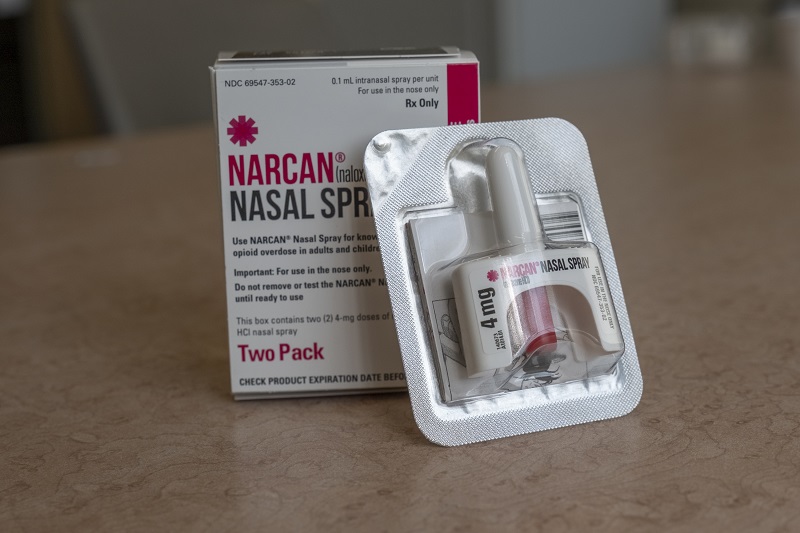Narcan: How to Use it & How it Works

September 23, 2022
Deaths from drug overdoses continue to be a very serious problem, with more than 100,000 deaths in the last year, mostly from opioid abuse.
The good news, though, is that there are several opioid antidotes readily available to reverse the effects of an overdose and save someone’s life, like Narcan.
What is Narcan?
First approved by the Food and Drug Administration (FDA) in 2015, Narcan is credited with saving tens of thousands of lives. The antidote comes in a nasal spray container and is available at pharmacies in all 50 states under the generic name Naloxone, or brand names like Narcan or Kloxxado.Narcan and other opioid antidotes are widely used by emergency medical personnel and other first responders.
These antidotes reverse respiratory difficulties in someone overdosing on opioids, and have been found to be very safe and effective when administered properly, and when the patient receives the proper medical attention after they are used.
How does Narcan work?
Naloxone-containing medications, like Narcan, work by reversing the effects of opioids.
Opioids impact the part of the brain that regulates breathing – an overdose can lead to slowed breathing, stopped breathing or even death. Narcan can restore normal breathing in two to three minutes.
What are the signs of an overdose?
Signs of a drug overdose can include:
- Unconsciousness
- Very small pupils
- Slow or shallow breathing
- Vomiting
- An inability to speak
- A faint heartbeat
- Limp arms and legs
- Pale skin
- Purple lips and fingernails
What to Do if You Suspect an Opioid Overdose:
- Call 911. If you believe someone has overdosed, immediately call 911 and then follow the operator’s instructions to administer the antidote, like Narcan, to the unconscious victim.
- Use Narcan. The easiest method is inserting the nasal spray in one of the victim’s nostrils and spraying once.
- Wait three minutes and if it hasn’t worked, administer a second dose. Someone who has ingested large amounts of opioids, or particularly potent ones such as fentanyl, often require a second dose.
- Keep them awake. Try to keep the person awake and breathing.
- Stay with them until emergency personnel arrive. The victim should be observed and monitored for two hours afterward.
Narcan works only on opioid overdoses, not those associated with other drugs such as methamphetamines. However, there are no adverse reactions if used on someone who has overdosed on a different drug, and you cannot get “high” on it.
Side effects of Narcan are rare and usually only involve occasional allergic reactions.
Where can you buy Narcan?
Narcan can be purchased over-the-counter, without a doctor’s prescription at your local pharmacy.
Some public health and state agencies also provide free Narcan to the public. The New Jersey Harm Reduction Coalition offers free naloxone at centers throughout the state. Health experts strongly advise that you only use FDA-approved antidotes.
“If a loved one has an opioid use problem, it’s a good idea to keep Narcan in the house, just in case,” shares addiction psychiatrist, James Sherer, M.D. “If you suspect overdose, always dial 911, but the use of an opioid antidote can be a crucial time saver to prevent brain injury and death.”
Next Steps & Resources:
- Meet our source: James Sherer, M.D.
- To make an appointment with a doctor near you, call 800-822-8905 or visit our website.
The material provided through HealthU is intended to be used as general information only and should not replace the advice of your physician. Always consult your physician for individual care.
Find a doctor near me

Helping Loved Ones Through Addiction
Some of the roughest times may be when a loved one is struggling with mental health and/or addiction issues - how do you help? Where do you start?

Can You Drink Alcohol in Recovery From Drug Addiction?
If you or a loved one is in recovery, you may have asked yourself, can you drink alcohol while in recovery from drug addiction?
Find a doctor near me

Telemedicine to Fill Mental Health Medications?
Running out of paper towels is a pain. Running out of medicine is an emergency. Learn more about telemedicine for behavioral health medication management.

The Science of the Sauce: What Happens to Your Brain When You Drink Alcohol?
Regina Krel, M.D., headache medicine specialist, shares an inside look at what happens to your brain when you drink, as well as the side effects afterwards.

What to Do When Coping Skills Don’t Work
Manage anxiety and stress? Dr. Markarian offers coping skills and strategies for better emotional well-being. Find support and resources now.

How Do I Know if I Have an Alcohol Use Disorder?
Concerned about alcohol use? Learn how to recognize alcohol use disorder from Dr. Juneja. Get support and treatment options now.
